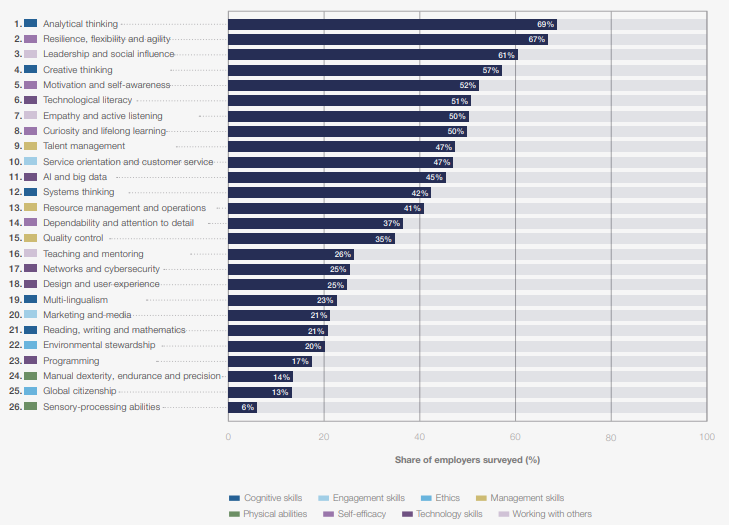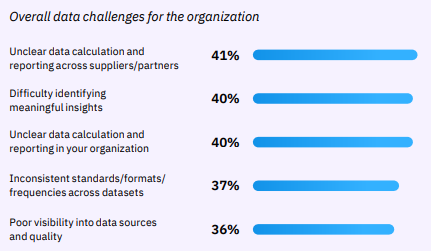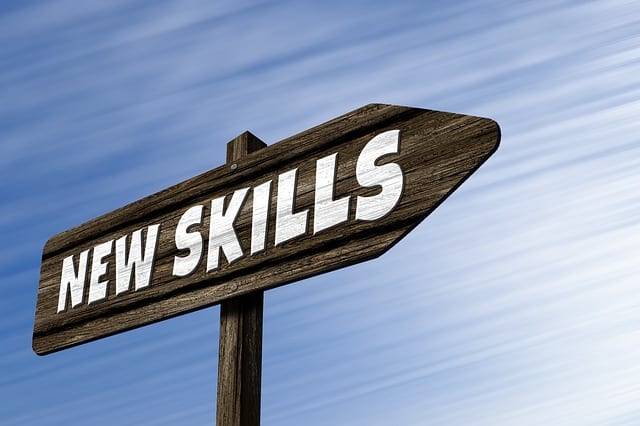Review these research insights for the most important job skills.
Last Updated: March 2025
In this article, we will highlight prominent research studies whose findings showcase the most important 21st century job skills needed for the future of work and organizations. Employees at all levels need to develop their innovation skills. These include competencies like creativity, critical thinking, communication, strategic thinking, and problem solving to find and develop creative solutions for the complex world we live in. (Contact us for recommended workshops that focus on developing innovation skills.)
1. The Bloomberg Job Skills Report
In previous years, Bloomberg would conduct a job skills study that asked job recruiters at various companies about the skills they want in their professionals. Their most recent study in collaboration with Reed Recruitment took place in the UK in 2024 and showed “soft skills” in high demand, including:
- Communication and interpersonal skills (67% of employers looking for this skill)
- Ability to learn and upskill (52%)
- Ability to adopt change (52%)
- Problem-solving (52%)
- Flexibility and adaptability (50%)
In the 2016 study, the most important skills mentioned were:
- Communication skills
- Strategic thinking
- Leadership skills
- Creative problem-solving
This collection of skills could be grouped together and described as “innovation skills” since all are vital to developing and launching an innovation. It takes creative problem solving, leadership, strategic thinking, and effective communication.
2. World Economic Forum Future of Jobs Research

Every year, the World Economic Forum publishes a Future of Jobs Report that identifies how jobs and skills will evolve within the next few years. The 2025 report identifies the top core skills as:
- Analytical thinking
- Resilience, flexibility, and agility
- Leadership and social influence
- Creative thinking
- Motivation and self-awareness
- Technological literacy
- Empathy and active listening
- Curiosity and lifelong learning
- Talent management
- Service orientation and customer service
Important to note, AI and big data came in at #11. We imagine this skill will continue to move up the list with the emergence of these technologies in all areas of our life!
The 2023 Report identified the top 10 core skills as:
- Analytical thinking
- Creative thinking
- Resilience, flexibility, and agility
- Motivation and self-awareness
- Curiosity and lifelong learning
- Technological literacy
- Dependability and attention to detail
- Empathy and active listening
- Leadership and social influence
- Quality control
The “changing nature of work” was cited as the biggest driver for the change in what is needed for the future. As in the other studies, the top skills could be described as innovation skills…creativity, critical thinking, and complex problem solving. These skills are essential to developing and bringing to life a new innovation that solves a real problem and provides meaningful value.
3. IBM Global C-Suite Studies

In IBM’s most recent Global C-Suite Study interviewing CEOs and top executives at organizations around the world, there are several interesting takeaways of note. Three out of four CEOs believe the organization with the most advanced generative AI wins, for example, indicating the importance of new technologies and technical skills to improve and inform strategic decisions. However, many organizations struggle to adapt these new technologies and use them wisely. Innovation and creative thinking skills are necessary to move forward in the changing times.
4. American Management Association (AMA) Critical Skills Surveys
In AMA’s 2020 Critical Skills survey, managers and other executives report the critical skills employees need at every level in an organization. 75.7% of the executives surveyed believe these 4C skills will be even more important for their organizations in the next three to five years. These skills were defined as:
- Critical thinking and problem solving – the ability to make decisions, solve problems and take action as appropriate.
- Effective communication – the ability to synthesize and transmit ideas in both written and oral formats.
- Collaboration and team building – the ability to work effectively with others, including those from diverse groups and those with opposing points of view.
- Creativity and innovation – the ability to see what’s NOT there and make something happen.
The pace of change (91%), global competition (86.5%), and nature of how work is accomplished today (77.5%) were the top factors selected for why the skills and competencies of critical thinking/problem solving, effective communication, collaboration/team building, and creativity/innovation were becoming more critical for organizations.
5. LinkedIn Data
LinkedIn uses their extensive data set to identify the skills that companies need most in their most recent 2025 skills report. The top skills identified were:
- AI Literacy
- Conflict Mitigation
- Adaptability
- Process Optimization
- Innovative Thinking
In the 2023 Workplace Learning Report, the top skills identified were:
- Management
- Communication
- Customer Service
- Leadership
- Sales
- Project Management
- Research
- Analytical Skills
- Marketing
- Teamwork
LinkedIn identified several skills necessary for remote or hybrid workplaces that will continue to be important in the coming years with restructuring across the board on how we live and work.
6. HRForecast
In an updated 2023 article from HRForecast, HR professionals identified hard and soft skills important when making hiring decisions, including:
- Technology (Cloud computing, cybersecurity, AI and machine learning, Big Data analytics)
- Digital Literacy
- Critical Thinking
- Interpersonal (Communication, mental flexibility, teamwork effectiveness)
- Self-Management
- Leadership
Innovation Skills In Action
You’ve just read insights from different prominent studies that highlight how critical innovation skills are for the future of work, organizations, and employees. How can you develop your innovative skills…integrating your skills of problem solving, creativity, collaboration, and communication together for the purpose of developing and taking action on an innovation that can have a positive impact? Can you put these skills to use to develop an innovation that seizes an opportunity or solves an important problem? Are you trained or prepared to do this? Doing this requires application of the important innovation skills you’ve read from the various research studies. What specific innovative learning and development initiative can you create for yourself?
If you are not receiving training or development of these critical skills in your organization, how can you be a change agent to help make that happen for yourself and others so that your organization can respond to the rapid change of pace and thrive in the future? It will take employees at all levels with higher stages of development of their innovation skills. It may even take innovating simply for the purpose of learning innovation.
Innovation Skill Specifics
For me, creativity, critical thinking, collaboration, and communication are very general skills that taken together are a part of a larger category I call innovation skills. There are many “micro-skills” that can make up these more general skills as there are many different modes of communication to master for innovation success. There is still opportunity to describe these more specifically. My favorite research zeroes right in on innovation skills…and what is happening in the mind of the innovator while innovating at their best.
Human Skills in an Artificial Intelligence Era
The key to staying relevant and growing in an age of machine learning could be human learning. Focus your own professional learning on the development and application of the kinds of skills humans are best at and robots don’t do well. Use these human skills to leverage emerging technologies for your benefit to add value to the humans you serve, your customers and users. Focus on how to stay relevant and grow during an era of artificial intelligence. Make sure that you continue to keep an eye to the research about the future of work to understand what skills are the most important for the changing future of your industry. Create an action plan on how to develop those skills and put them strategically to use. Skills like empathy, imagination, creativity, strategy, communication, collaboration, and teamwork are important leadership skills for anyone to develop in the present and for our future. Consider soft skills training workshops for your organization (or self).
What specific skills do you think are most important for the future? How do you think individuals or organizations can develop them? How might you advance these important innovation skills through a focused learning and development approach like innovation workshops?
How might we help students (and ourselves) to learn and develop these skills? Another great source of learning the skills of the future we should be teaching is Harvard’s Tony Wagner. He is the author of many books on the topic and the “7 survival skills” he identifies are:
- Critical thinking and problem solving
- Collaboration across networks and leading by influence
- Agility and adaptability
- Initiative and entrepreneuralism
- Effective oral and written communication
- Accessing and analyzing information
- Curiosity and imagination
